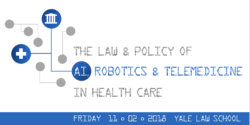 My guest post Big Data: Destroyer of Informed Consent for this Friday’s Yale Workshop on “The Law and Policy of AI, Robotics & Telemedicine” is now online at the Balkanization blog.
My guest post Big Data: Destroyer of Informed Consent for this Friday’s Yale Workshop on “The Law and Policy of AI, Robotics & Telemedicine” is now online at the Balkanization blog.
Consent, that is ‘notice and choice,’ is a fundamental concept in the U.S. approach to data privacy, as it reflects principles of individual autonomy, freedom of choice, and rationality. Big Data, however, makes the traditional approach to informed consent incoherent and unsupportable, and indeed calls the entire concept of consent, at least as currently practiced in the U.S., into question.
Big Data kills the possibility of true informed consent because by its very nature one purpose of big data analytics is to find unexpected patterns in data. Informed consent requires at the very least that the person requesting the consent know what she is asking the subject to consent to. In principle, we hope that before the subject agrees she too comes to understand the scope of the agreement. But with big data analytics, particularly those based on Machine Learning, neither party to that conversation can know what the data may be used to discover.
I then go on to discuss the Revised Common Rule, which governs any federally funded human subjects research. The revision takes effect in early 2019, and it relaxes the informed consent rule in a way that will set a bad precedent for private data mining and research. Henceforth researchers will be permitted to obtain open-ended “broad consent”–-i.e. “prospective consent to unspecified future research”–-instead of requiring informed consent, or even ordinary consent, on a case-by-case basis. That’s not a step forward for privacy or personal control of data, and although it’s being driven by genuine public health concerns the side-effects could be very widespread.
